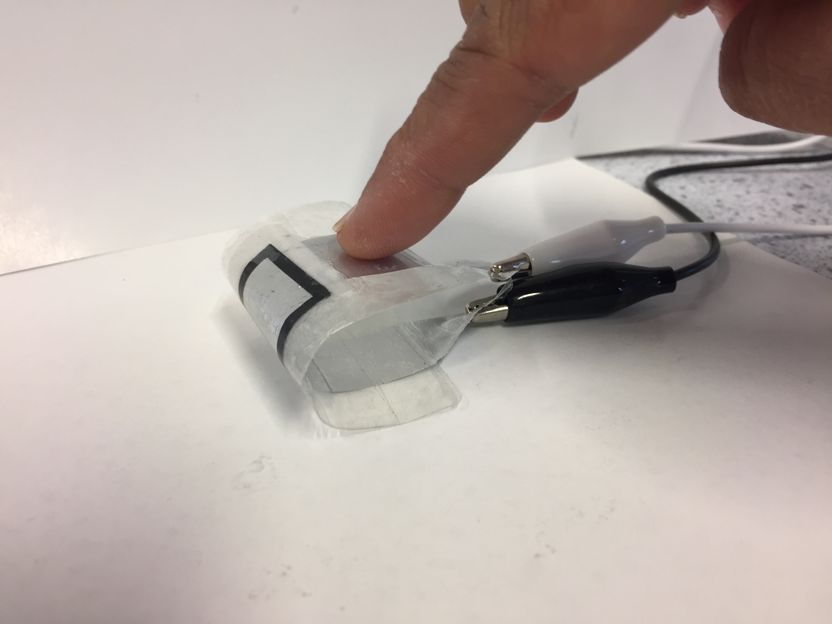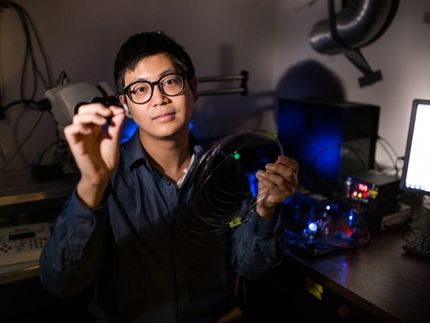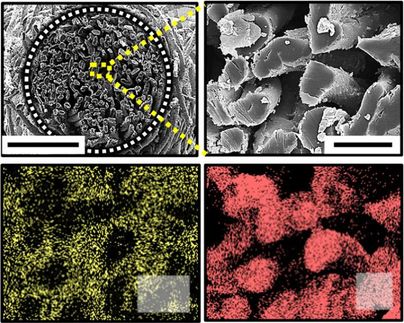Flexible rechargeable batteries for pacemakers
Experts at Queen’s University Belfast have designed a flexible and organic alternative to the rigid batteries that power up medical implants.

The battery is shown
Queen's University Belfast
Currently, devices such as pacemakers and defibrillators are fitted with rigid and metal based batteries, which can cause patient discomfort.
Dr Geetha Srinivasan and a team of young researchers from Queen's University Ionic Liquid Laboratories (QUILL) Research Centre, have now developed a flexible supercapacitor with a longer cycle life, which could power body sensors.
The flexible device is made up of non-flammable electrolytes and organic composites, which are safe to the human body. It can also be easily decomposed without incurring the major costs associated with recycling or disposing off metal based batteries.
The findings show that the device could be manufactured using readily available natural feedstock, rather than sophisticated and expensive metals or semiconductors.
Dr Srinivasan explains: “In modern society, we all increasingly depend on portable electronics such as smartphones and laptops in our everyday lives and this trend has spread to other important areas such as healthcare devices.
“In medical devices such as pacemakers and defibrillators there are two implants, one which is fitted in the heart and another which holds the metal based, rigid batteries - this is implanted under the skin.
“The implant under the skin is wired to the device and can cause patients discomfort as it is rubs against the skin. For this reason batteries need to be compatible to the human body and ideally we would like them to be flexible so that they can adapt to body shapes.”
Dr Srinivasan adds: “At Queen’s University Belfast we have designed a flexible energy storage device, which consists of conducting polymer - biopolymer composites as durable electrodes and ionic liquids as safer electrolytes.
“The device we have created has a longer life-cycle, is non-flammable, has no leakage issues and above all, it is more flexible for placing within the body.”
While the findings show that there are many advantages in the medical world, the organic storage device could also provide solutions in wearable electronics and portable electronic devices, making these more flexible.
Ms Marta Lorenzo, PhD researcher on the project at Queen’s University Belfast, commented: “Although this research could be a potential solution to a global problem, the actual supercapacitor assembly is a straightforward process.”
Dr Srinivasan says: “There is also opportunity to fabricate task-specific supercapacitors. This means that their properties can be tuned and also manufactured using environmentally friendly methods, which is important if they are to be produced on a large scale, for example in powering portable personal electronic devices.”
Original publication
Most read news
Other news from the department science

Get the life science industry in your inbox
By submitting this form you agree that LUMITOS AG will send you the newsletter(s) selected above by email. Your data will not be passed on to third parties. Your data will be stored and processed in accordance with our data protection regulations. LUMITOS may contact you by email for the purpose of advertising or market and opinion surveys. You can revoke your consent at any time without giving reasons to LUMITOS AG, Ernst-Augustin-Str. 2, 12489 Berlin, Germany or by e-mail at revoke@lumitos.com with effect for the future. In addition, each email contains a link to unsubscribe from the corresponding newsletter.
Most read news
More news from our other portals
Last viewed contents
Category:DNA_repair
Carvacrol
United_States_Army_Pike’s_Peak_Research_Laboratory
List_of_subjects_in_Gray's_Anatomy:_X._The_Organs_of_the_senses_and_the_Common_integument
GDP-fucose_protein_O-fucosyltransferase_2
List_of_subjects_in_Gray's_Anatomy:_XI._Splanchnology
Freie Universität first institution in Germany to integrate medication management into the pharmacy study program
Gaucher's_disease
Diabetes_UK

Beckman Coulter and Fujirebio enter into partnership - The goal is a patient-friendly, blood-based Alzheimer's disease test























































